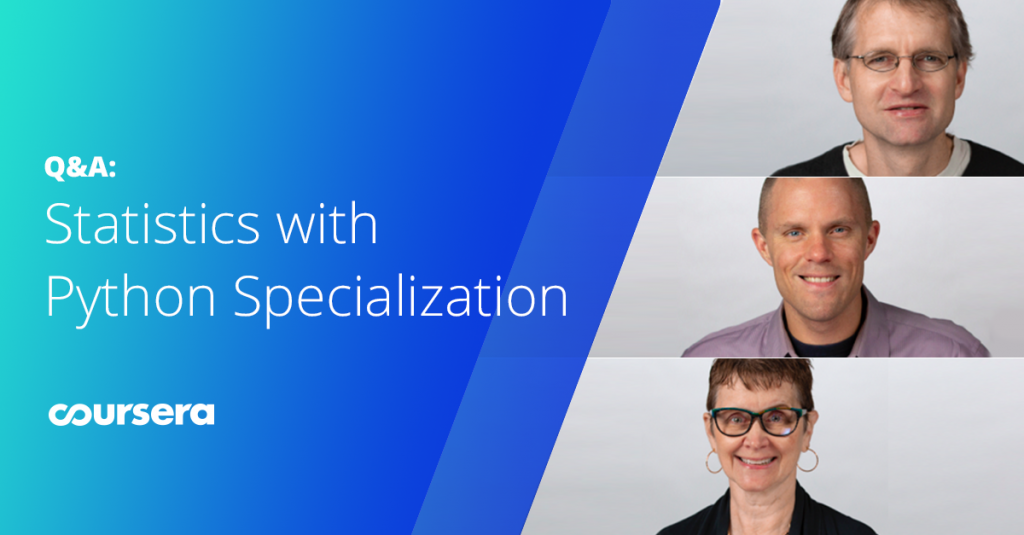New Statistics with Python Specialization from the University of Michigan
Author: Iris
Go to Source

Statistics with Python is a newest Specialization from the University of Michigan, and enables anyone who has taken the massively popular Python for Everybody Specialization to take the next step in their data science education. This Specialization is also recommended if you’re considering the University of Michigan Master of Applied Data Science degree program.
In this 3-course Specialization you’ll learn how to use Python to understand statistical studies and reports from three experts: Dr. Brenda Gunderson, Lecturer IV and Research Fellow, Department of Statistics, Dr. Kerby Shedden, Professor, Department of Statistics, and Dr. Brady T. West, Research Associate Professor, Institute for Social Research. We spoke with the instructors to learn more about the Specialization’s unique lab-based approach and the big ideas you can use across multiple domains.
1. What is Statistics with Python?
This Specialization aims to introduce a broad audience of learners to modern statistical thinking. Not only will Statistics with Python introduce essential statistical concepts in a fun and engaging way, but it will also give you several opportunities to analyze real data using Python, and apply the concepts to real problems. We truly love teaching and emphasizing the real-world applications of statistics, and we think this blend of an applied pedagogical approach with popular software for data management and analysis makes for a very unique and exciting Specialization. We think that the three courses will appeal to people who are curious about statistics and the broadness in application is also why so many folks are interested in the discipline these days. You will leave this Specialization armed with some pretty powerful tools enabling you to gain interesting insights from data.
2. What excites you about Statistics with Python?
It may be surprising how easy it can be to manipulate data and then perform statistical analyses using Python.
You don’t have to be a programming expert to effectively use Python for statistical analysis.
People may have an immediate negative reaction when they hear “statistics” because they took a difficult class or because they only think of mathematics. To our team, statistics is a discipline that focuses on how to effectively work with real-world data and make decisions based on that data, and this Specialization takes the approach that anyone can approach data with modern statistical thinking. The detailed examples that include careful explanations of the Python code should appeal to a wide audience, and this certainly excites us about the potential of this Specialization to disseminate knowledge about statistical thinking.
3. Who should take this Specialization?
The ideal learner for this Specialization would be anyone who frequently has to deal with numbers in their everyday life, and would like to make more meaning out of those numbers. This could be an undergraduate or graduate student in any field that makes use of quantitative research who wants to expand their analytic skills: a small business owner who wishes to visualize and analyze trends in sales and clientele; an academic or clinical researcher familiar with Python (or any statistical software for that matter!) who wants to broaden their statistical knowledge; a government employee responsible for analyzing data; a market researcher who wishes to perform inferential statistical analyses using Python; the list goes on and on. Anyone who has the opportunity to work with data and is interested in broadening their computing and statistical skills would benefit tremendously from this Specialization. Anyone with even a basic curiosity about how Python can be used to analyze data (no experience required!) would really get a lot out of these three courses.
4. Why was this Specialization created?
There are several Coursera courses on Python or statistics, but no Specialization has combined these topics in the way that this Specialization does. This Specialization will walk you through a wide variety of examples of real statistical analysis using Python, and this blend of hands-on experience with top-notch instruction fills an important need in data science education.
5. After completing this Specialization, what will learners be able to take away?
After you complete this Specialization you’ll be able to demonstrate a strong working knowledge of applied statistics, including basic conceptual knowledge of study design, descriptive statistical analysis, data visualization, confidence interval construction, hypothesis testing, regression modeling, and analysis of clustered or longitudinal data. What makes this Specialization unique is that you can demonstrate that you have hands-on experience performing all of these types of analyses using Python software, which will look very attractive on a resume in today’s job market.
The post New Statistics with Python Specialization from the University of Michigan appeared first on Coursera Blog.
